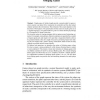19 search results - page 3 / 4 » Quantitative Game Semantics for Linear Logic |
TLCA
2009
Springer
13 years 11 months ago
2009
Springer
G¨odel’s completeness theorem is concerned with provability, while Girard’s theorem in ludics (as well as full completeness theorems in game semantics) are concerned with proo...
POPL
2010
ACM
14 years 2 months ago
2010
ACM
We describe a new automatic static analysis for determining upper-bound functions on the use of quantitative resources for strict, higher-order, polymorphic, recursive programs de...
CSL
2007
Springer
13 years 11 months ago
2007
Springer
Abstract. Probably the most significant result concerning cut-free sequent calculus proofs in linear logic is the completeness of focused proofs. This completeness theorem has a n...
APAL
2007
13 years 4 months ago
2007
In this paper, we present a categorical model for Multiplicative Additive Polarized Linear Logic MALLP, which is the linear fragment (without structural rules) of Olivier Laurent�...
CONCUR
2010
Springer
13 years 5 months ago
2010
Springer
Abstract. Graph games of infinite length provide a natural model for open reactive systems: one player (Eve) represents the controller and the other player (Adam) represents the en...

